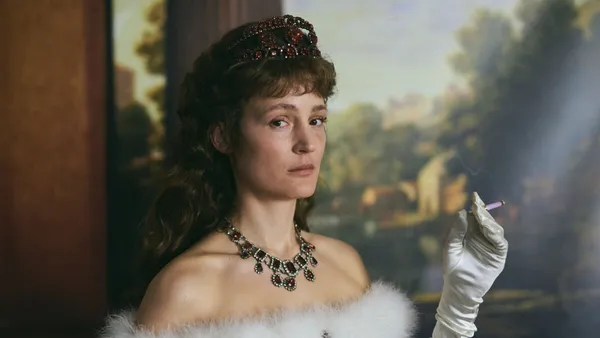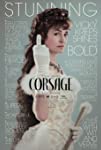Eye For Film >> Movies >> Corsage (2022) Film Review
Corsage
Reviewed by: Anne-Katrin Titze

Marie Kreutzer’s focus in Corsage (Austria’s Oscar entry and a Main Slate selection of the 60th New York Film Festival, produced by Toni Erdmann director Maren Ade) is on Empress Elisabeth of Austria turning 40 years old. Vicky Krieps, who shared the Cannes Film Festival Un Certain Regard Best Performance Award is in excellent form and up to the task of presenting to us the icon in all her idiosyncrasies. It is December 1877 and the Empress holds her breath, literally and more than once, in a cold bath or while her corset is laced ever more tightly by her maids, she sometimes confuses. Is it Hanni or Fini?
Her husband, the Emperor Franz Joseph I (Florian Teichtmeister) knows who is the thinner one and leaves out no opportunity to comment on what he sees as female physical decay in middle age. It’s all numbers - how long she can hold her breath underwater in the ice baths, how tiny she can manage her waist to be. Without this sense of control her life would surely fall apart. Teaching cousin Ludwig II (Manuel Rubey) the art of fainting naturally, Krieps charmingly doubles up on the message of the performative. Here is an actress playing royalty playing at fainting in order to escape the pressures of the public eye.

Some of the winks to the present work better than others in Corsage. When Sisi and three of her ladies-in-waiting, accompanied by a gaggle of dogs, enter the palace, Charlie’s Angels like in slow motion, we hear a female singer with the omnipresent 21st century choky-sexy voice croak how “she was lost.” When Sofia Coppola made anachronistic music choices for Marie Antoinette it was fresh, now it feels as though Kreutzer didn’t fully trust her own vision, which in other scenes is much more artful and deep. “We love in the other what we’d like to be,” says Sisi, encroaching more and more on Lacan territory and the desire of the desire of the Other.
Horseback riding, fencing lessons, and trips to get out of stuffy old Vienna promise a little bit of freedom from the excruciating scrutiny by the press who love her and comment ceaselessly on every aspect of her being. The costume design (by Monika Buttinger) is exquisite, as it wraps her body in skins, a collar of feathers, a shell for the body recalling fish scales. She is a wild creature, trapped in the body of an empress, and the clothing, despite the fact of the corset strangling her organs, still feels as though the animal kingdom is closer to her than the humans of the court.
What is it about Empress Elisabeth of Austria that makes her so inexhaustibly fascinating? The answers are many. Born a Bavarian duchess from the House of Wittelsbach on Christmas Eve 1837 and assassinated at age 60 in Geneva by an anarchist - her life has been a very full and extraordinary one. Sisi’s role in establishing the K&K dual monarchy of Austria-Hungary in 1867, her distinct and often extreme fitness and diet regime, the Rapunzel-like hair, the extensive travels, what happened with her son at Mayerling, the bond with her cousin, the “mad” swan king Ludwig II (whose castle to this day shines from many a Disney logo) - all this has been floating in public consciousness in waves of popularity.
In other words, Sisi never drowned. There are the famous midcentury Sissi films (with double s, though the real Sisi preferred one) with Romy Schneider which are in the German speaking world the equivalent of The Wizard Of Oz or It’s A Wonderful Life as holiday treats. A recent boom of rediscovery portrays her in various TV series, In László Nemes’s excellent 2019 movie Sunset (Napszállta) she is a haunting presence in absence, and Frauke Finsterwalder’s Sisi & I (screenplay with Christian Kracht, starring Sandra Hüller and Susanne Wolff as Sisi) is scheduled to be released next year.
“At 40 a person dissolves,” Sisi says and her husband as well as the painter hired for her final official portrait keep shooting arrows at her self-confidence about her weight and complexion. Her visit to hospitals and especially a women’s ward for the insane comfort her and as she distributes neatly wrapped purple parcels of candied violets to patients, she also initiates the installation of modern bathrooms for the institution. The veil on her face is a finely-spun sibling to the netting around the “melancholic” women’s beds. What was the reason a particularly despondent woman was brought to the asylum for treatment, the monarch inquires. “Adultery” is the bombshell response.
Her little nine-year old daughter Valerie (Rosa Hajjaj) does not bond with her mother. Nighttime riding escapades are not her thing and only make her sick. She is her father’s daughter and loves the order of Schönbrunn Castle, which to Sisi resembles a prison. “You are the child, Mama” she says in frustration. Yes, Sisi lives in a world of her own, and the privileges she has are enviable compared to most women at the time. And yet, she is clearly stifled and would love to be the one to invent air conditioning or be involved in politics more. When she confronts “FJ”, as he is called here, about being kept out of any important political decisions, he points to the reason why he married her in the first place - to be ornament, physical representation, “a good picture,” not flesh and blood and intellect and energy and stride.
What is there to be unhappy about? How would he feel if he had nothing to do but having his hair braided all day? Sometimes this Sisi sticks out her tongue or uses language she probably wouldn’t have used in the 19th century like that, which feels a little too eager to get young audiences to relate, although it is very clear how much her story resonates today. During a trip to England (with the filming location looking rather continental) to visit an old friend together with her sister, she is introduced to a brand-new invention: moving pictures! The invented scenes with Finnegan Oldfield as Louis Le Prince (who sports an earring) are lovely and provide great context of the times. “I love to look at you looking at me,” she tells her “riding instructor” before a tragic accident cuts the trip short.
In May 1878 she escapes to visit cousin Ludwig II, and they resume the way they played together as children. His castles are crumbling around the chandeliers and so are his teeth from the many sweets he consumes. In a particularly powerful scene, he pours liquid chocolate into Sisi’s mouth. We had seen her eat nothing more than thinly sliced oranges and broth up to this point, and the overflowing “comforting” pitch-black lava coming out of her mouth feels like a final eruption of the hell she held deep inside. Krieps’s laugh at that moment is perfect. The cousins swim in Lake Starnberg at night and speak of death. “You can’t drown in my lake,” he says to her, “It’s my lake.” The line drew a big laugh at the press screening and I wondered how many in the audience were aware of Ludwig’s fate in selfsame lake in 1886. TS Eliot alluded to it 100 years ago in the eighth line of part I. The Burial Of The Dead in The Waste Land.
When the “absolutely harmless” novelty called heroin is prescribed to Sisi by her doctor, because 40 matches the average life expectancy for women in the late 1870s, things change for her. Her long hair will see scissors for the first time, a double steps up to fulfil more official duties, and a creamy, teenaged, twice married Viennese commoner FJ has had his eyes on, is officially interviewed by the Empress. In Tarantino style, Kreutzer takes liberties with historic facts, especially with the ending, which represents a leap into the unknown.
Reviewed on: 28 Sep 2022

















